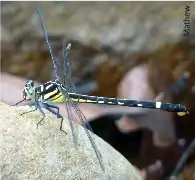Davidioides martini
Davidioides martini,[2] Syrandiri clubtail,[1] is a species of dragonfly in the family Gomphidae. It is known only from the Western Ghats of India.[3][1]
| Davidioides martini | |
|---|---|
 | |
| from Thattekkad, Kerala | |
| Scientific classification | |
| Kingdom: | |
| Phylum: | |
| Class: | |
| Order: | |
| Family: | |
| Genus: | Davidioides |
| Species: | D. martini |
| Binomial name | |
| Davidioides martini Fraser, 1924 | |
Description and habitat
It is a medium sized dragonfly with thorax black on dorsum, and yellow on the sides. There is a slightly oblique ante-humeral stripe and two narrow parallel black stripes on the sutures enclosing an equally narrow yellow line. Abdomen is black, marked with yellow. Segment 1 has a large spot on the dorsum and the sides. Segment 2 has a mid-dorsal spot. Segment 3 to 7 have basal rings, narrow on 3 to 6, occupying the basal half on segment 7. Segment 8 to 10 are unmarked. Anal appendages are yellow, black on the base.[4][5][6][7]
This species is found in banks of montane forest streams where it breeds.[6]
References
- Sharma, G. (2010). "Davidioides martini". IUCN Red List of Threatened Species. 2010: e.T169121A6569873. doi:10.2305/IUCN.UK.2010-4.RLTS.T169121A6569873.en. Retrieved 20 November 2021.
- "World Odonata List". Slater Museum of Natural History. Archived from the original on 2021-06-24. Retrieved 2018-10-02.
- K.A., Subramanian; K.G., Emiliyamma; R., Babu; C., Radhakrishnan; S.S., Talmale (2018). Atlas of Odonata (Insecta) of the Western Ghats, India. Zoological Survey of India. pp. 215–216. ISBN 9788181714954.
- Subramanian, K. A. (2005). Dragonflies and Damselflies of Peninsular India - A Field Guide.
- "Davidioides martini Fraser, 1924". India Biodiversity Portal. Retrieved 4 October 2018.
- C FC Lt. Fraser (1934). The Fauna of British India, including Ceylon and Burma, Odonata Vol. II. Red Lion Court, Fleet Street, London: Taylor and Francis. pp. 227-228.
- C FC Lt. Fraser (1924). A Survey of the Odonate (Dragonfly) Fauna of Western India and Descriptions of Thirty New Species (PDF). pp. 472–473.
